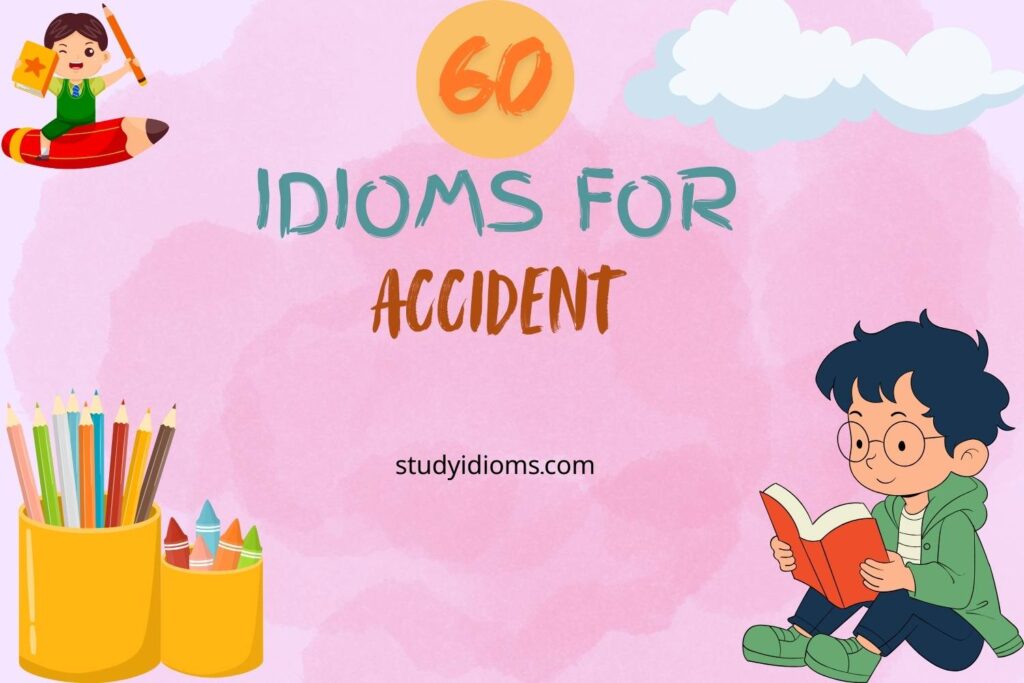Accidents can happen at any time. Sometimes they are small, like spilling milk, and other times they are big, like a car crash. People often talk about accidents using special phrases. These phrases are called idioms. Idioms don’t mean exactly what the words say. They have a different meaning that makes the idea easier or more fun to understand.
In this article, you’ll learn about idioms people use when something goes wrong by accident. These idioms help us talk about surprises, mistakes, or unlucky things in a simple way. You might hear them from friends, in movies, or in books. By learning them, you can also use these phrases to explain things better when something unexpected happens.
Idioms for Accident
1. Slip through the cracks
Meaning: Missed or forgotten by mistake.
Within a Sentence: My homework slipped through the cracks and didn’t get turned in. / The toy order slipped through the cracks at the store.
In Other Words: It was missed by accident. / Someone forgot by mistake.
2. By accident
Meaning: Not done on purpose.
Within a Sentence: I called the wrong number by accident. / She spilled her juice by accident.
In Other Words: It was a mistake. / It wasn’t planned.
3. Let it slip
Meaning: Say something without meaning to.
Within a Sentence: I let it slip about the surprise party. / He let it slip that we had pizza for lunch.
In Other Words: I said it by mistake. / He told without thinking.
4. Spill the beans
Meaning: Share a secret by mistake.
Within a Sentence: He spilled the beans about Mom’s gift. / I spilled the beans during lunch.
In Other Words: He told the secret. / I said it when I shouldn’t have.
5. Trip up
Meaning: Make a mistake.
Within a Sentence: I tripped up on the hard math question. / She tripped up during the spelling test.
In Other Words: I got it wrong. / She made a mistake.
6. Hit the wrong button
Meaning: Press something by mistake.
Within a Sentence: I hit the wrong button and deleted the game. / She hit the wrong button on the microwave.
In Other Words: I pressed the wrong thing. / It was an error.
7. Go off the rails
Meaning: Go out of control.
Within a Sentence: The class went off the rails after the teacher left. / My plan went off the rails.
In Other Words: Things got crazy. / The plan didn’t work.
8. A slip of the tongue
Meaning: Say the wrong thing by mistake.
Within a Sentence: I called her the wrong name it was a slip of the tongue. / He said “cat” instead of “hat.”
In Other Words: He said the wrong word. / I made a word mistake.
9. Off the cuff
Meaning: Said without thinking.
Within a Sentence: He answered off the cuff and got it wrong. / I made a joke off the cuff.
In Other Words: He didn’t plan the answer. / I said it without thinking.
10. Mess up
Meaning: Make a mistake.
Within a Sentence: I messed up the art project. / He messed up his shoes in the mud.
In Other Words: I made a mistake. / He got them dirty.
11. Knock over
Meaning: To hit something so it falls.
Within a Sentence: I knocked over my juice glass. / She knocked over the game pieces.
In Other Words: I made it fall by accident. / She bumped it without meaning to.
12. Blow it
Meaning: Fail at something by mistake.
Within a Sentence: I blew it by saying the wrong answer. / He blew it when he forgot his lines.
In Other Words: I messed up. / He made a mistake.
13. Crash and burn
Meaning: Fail badly.
Within a Sentence: I tried skateboarding but crashed and burned. / His project crashed and burned.
In Other Words: It didn’t go well. / It was a big mistake.
14. Take a wrong turn
Meaning: Make a bad or wrong choice.
Within a Sentence: We took a wrong turn on our trip. / I took a wrong turn in the game.
In Other Words: We got lost. / I chose the wrong path.
15. Bark up the wrong tree
Meaning: Blame the wrong person or thing.
Within a Sentence: I was barking up the wrong tree when I blamed her. / He barked up the wrong tree with that guess.
In Other Words: I was wrong. / He guessed badly.
16. Drop the ball
Meaning: Make a mistake by forgetting.
Within a Sentence: I dropped the ball and forgot to bring my homework. / She dropped the ball on her chores.
In Other Words: I forgot. / She didn’t do her part.
17. Off the mark
Meaning: Not correct.
Within a Sentence: My answer was way off the mark. / His guess was off the mark.
In Other Words: I was wrong. / He was not close.
18. Out of line
Meaning: Do something wrong.
Within a Sentence: Throwing food was out of line. / He was out of line when he shouted.
In Other Words: It was not okay. / He acted badly.
19. Run into trouble
Meaning: Get into a bad situation.
Within a Sentence: We ran into trouble with the bike. / I ran into trouble with the test.
In Other Words: Something went wrong. / I had problems.
20. Hit a snag
Meaning: Face a small problem.
Within a Sentence: We hit a snag building the treehouse. / I hit a snag with my science project.
In Other Words: We had a small issue. / Something didn’t go right.
21. In a jam
Meaning: In a difficult situation.
Within a Sentence: I was in a jam when I lost my keys. / He got in a jam with the game rules.
In Other Words: I was stuck. / He had a problem.
22. Put your foot in your mouth
Meaning: Say something embarrassing.
Within a Sentence: I put my foot in my mouth when I laughed at the wrong time. / He put his foot in his mouth by calling her the wrong name.
In Other Words: I said something I shouldn’t have. / He said the wrong thing.
23. Out of the blue
Meaning: Something that happens suddenly and unexpectedly.
Within a Sentence: The lights went out out of the blue. / It started raining out of the blue.
In Other Words: It happened suddenly. / It surprised us.
24. Blow out of proportion
Meaning: Make a small mistake seem big.
Within a Sentence: She blew the accident out of proportion. / Don’t blow my mistake out of proportion.
In Other Words: She made it sound worse. / It wasn’t a big deal.
25. Catch off guard
Meaning: Surprise someone.
Within a Sentence: The pop quiz caught me off guard. / I was caught off guard by the sudden stop.
In Other Words: I wasn’t ready. / It surprised me.
26. Go haywire
Meaning: Stop working properly.
Within a Sentence: My computer went haywire during class. / The robot went haywire and spun around.
In Other Words: It acted wrong. / It didn’t work right.
27. Out of whack
Meaning: Not working right.
Within a Sentence: The clock is out of whack. / My printer is out of whack.
In Other Words: It’s broken. / It’s not right.
28. Make a scene
Meaning: Cause a public problem.
Within a Sentence: He made a scene when he dropped the cake. / She made a scene at the store.
In Other Words: Everyone noticed. / It was embarrassing.
29. Fall apart
Meaning: Something breaks or doesn’t work.
Within a Sentence: My project fell apart on the way to school. / Her plan fell apart.
In Other Words: It didn’t work. / It broke.
30. Off the hook
Meaning: Get out of trouble.
Within a Sentence: He was off the hook after the truth came out. / I got off the hook when she admitted it.
In Other Words: I wasn’t in trouble anymore. / He didn’t get blamed.
31. Come unglued
Meaning: Lose control or fall apart emotionally.
Within a Sentence: She came unglued after the fall. / I came unglued when I lost my backpack.
In Other Words: She got upset. / I got really worried.
32. A rough patch
Meaning: A time when things go wrong.
Within a Sentence: Our team is in a rough patch. / He hit a rough patch with his grades.
In Other Words: Things aren’t going well. / He’s having trouble.
33. Out of place
Meaning: Not where it belongs.
Within a Sentence: My shoes were out of place in the hallway. / The phone looked out of place on the floor.
In Other Words: It was in the wrong spot. / It didn’t belong there.
34. Rain on someone’s parade
Meaning: Ruin someone’s happy moment.
Within a Sentence: The power outage rained on our parade. / He rained on my parade with bad news.
In Other Words: It ruined the fun. / It spoiled the moment.
35. On thin ice
Meaning: Close to getting in trouble.
Within a Sentence: After being late, I was on thin ice. / She’s on thin ice with her teacher.
In Other Words: One more mistake could mean trouble. / She needs to be careful.
36. Hit the skids
Meaning: Start going badly.
Within a Sentence: My project hit the skids after I lost my notes. / His day hit the skids early.
In Other Words: Things went wrong. / It started badly.
37. Go south
Meaning: Get worse.
Within a Sentence: The plan went south after the mistake. / His mood went south fast.
In Other Words: It turned bad. / He got upset.
38. Out of the loop
Meaning: Not knowing what happened.
Within a Sentence: I was out of the loop about the field trip. / He was out of the loop on the project.
In Other Words: I didn’t know. / He wasn’t told.
39. Make a mess of
Meaning: Do something badly.
Within a Sentence: I made a mess of my art. / He made a mess of cleaning.
In Other Words: I didn’t do it well. / It turned out wrong.
40. Turn turtle
Meaning: Flip over by accident.
Within a Sentence: My toy boat turned turtle in the tub. / The wagon turned turtle on the hill.
In Other Words: It flipped over. / It tipped.
41. Upset the apple cart
Meaning: Ruin a plan.
Within a Sentence: The rain upset the apple cart for our picnic. / She upset the apple cart by telling the secret.
In Other Words: It spoiled the plan. / The surprise was ruined.
42. Go belly up
Meaning: Fail completely.
Within a Sentence: My cookie design went belly up. / His idea went belly up.
In Other Words: It didn’t work. / It was a flop.
43. Not mean to
Meaning: Something was an accident.
Within a Sentence: I didn’t mean to bump into you. / She didn’t mean to break the glass.
In Other Words: It wasn’t on purpose. / It was by mistake.
44. Trip over your own feet
Meaning: Make a clumsy mistake.
Within a Sentence: I tripped over my own feet during the dance. / He tripped and dropped the gift.
In Other Words: I messed up by accident. / It was clumsy.
45. A slip-up
Meaning: A small mistake.
Within a Sentence: I made a slip-up on the math test. / That was just a slip-up with the spelling.
In Other Words: It was a tiny mistake. / A little error.
46. Blow out
Meaning: A tire or light stops working suddenly.
Within a Sentence: The bike tire blew out on the hill. / The light bulb blew out during reading.
In Other Words: It popped or stopped working.
47. Off base
Meaning: Wrong about something.
Within a Sentence: I was off base about the due date. / He was off base thinking we had gym.
In Other Words: I was wrong. / He made a mistake.
48. Go off
Meaning: Happen suddenly, like an alarm or noise.
Within a Sentence: The alarm went off during class. / The balloon went off when it popped.
In Other Words: It made a loud sound. / It burst suddenly.
49. Mistake one thing for another
Meaning: Get confused.
Within a Sentence: I mistook salt for sugar. / She mistook the dog’s toy for her own.
In Other Words: I got mixed up. / She confused it.
50. Miss the boat
Meaning: Be too late or miss a chance.
Within a Sentence: I missed the boat on signing up. / He missed the boat for the contest.
In Other Words: I was too late. / He didn’t join in time.
51. Fumble
Meaning: Drop or mess up something clumsily.
Within a Sentence: I fumbled my lunch tray. / He fumbled the ball during the game.
In Other Words: I dropped it. / He didn’t catch it.
52. Have an oops moment
Meaning: Do something silly by accident.
Within a Sentence: I had an oops moment and dropped my book. / That was an oops moment with the glue.
In Other Words: A small goof. / A tiny mistake.
53. Botch it
Meaning: Do it badly.
Within a Sentence: I botched the drawing. / She botched the cupcake recipe.
In Other Words: I messed up. / It didn’t go right.
54. Overlook
Meaning: Miss seeing something.
Within a Sentence: I overlooked a question on the test. / He overlooked the missing piece.
In Other Words: I missed it. / I didn’t notice.
55. Slip-up
Meaning: Small error.
Within a Sentence: That was just a slip-up on the form. / He had a slip-up during practice.
In Other Words: A small mistake. / A tiny error.
56. Blow cover
Meaning: Reveal something by mistake.
Within a Sentence: He blew his cover during the surprise. / I blew cover by laughing.
In Other Words: I gave it away. / The surprise was ruined.
57. All over the place
Meaning: Disorganized or messy.
Within a Sentence: My notes were all over the place. / The toys were all over the place.
In Other Words: It was messy. / Not neat.
58. Goof up
Meaning: Make a silly mistake.
Within a Sentence: I goofed up and wore two different socks. / He goofed up his lines in the play.
In Other Words: I made a funny mistake. / He messed up.
59. Oops
Meaning: Word used after a small mistake.
Within a Sentence: Oops, I dropped my pencil. / Oops, I said the wrong name.
In Other Words: Uh-oh. / My bad.
60. Trip over words
Meaning: Speak in a clumsy way.
Within a Sentence: I tripped over my words during the speech. / He tripped over words reading out loud.
In Other Words: I couldn’t talk clearly. / I got tongue-tied.
Idioms for Accident – True/False Quiz
- Saying “by accident” means something was done on purpose.
True / False - If someone “spills the beans,” they keep a secret very well.
True / False - “Drop the ball” means you made a mistake or forgot something.
True / False - When a person “makes a scene,” it means they quietly fix a problem.
True / False - “Slip of the tongue” means someone said the wrong thing by mistake.
True / False - If your project “falls apart,” it means it stayed perfect the whole time.
True / False - “Trip over your own feet” means someone walked smoothly without errors.
True / False - When something goes “haywire,” it is working better than before.
True / False - “Out of the blue” means something happened suddenly and without warning.
True / False - If someone “puts their foot in their mouth,” they said something they didn’t mean to.
True / False - “Hit a snag” means you had a smooth, easy time.
True / False - If you’re “on thin ice,” you are close to getting in trouble.
True / False - “All over the place” describes something neat and tidy.
True / False - “Miss the boat” means you were too late for something.
True / False - Saying “oops” is something people say after making a small mistake.
True / False
Answer Key
- False
- False
- True
- False
- True
- False
- False
- False
- True
- True
- False
- True
- False
- True
- True
Scoring Guide
- 15 Correct Answers: Idioms Master!
- 10–14 Correct Answers: You really get Idioms, nice work!
- 6–9 Correct Answers: You’re learning, keep going!
- 0–5 Correct Answers: Let’s learn about Idioms together!
Conclusion
Idioms can help us describe accidents in fun and simple ways. Instead of saying “I made a mistake,” we can use phrases like “drop the ball” or “trip up.” These idioms make our language more interesting and easier to understand.
Now that you know many idioms for accidents, try using them when you talk or write. They can help you explain things that happen by mistake in a better way. Keep practicing, and you’ll get even better at using these everyday phrases.



